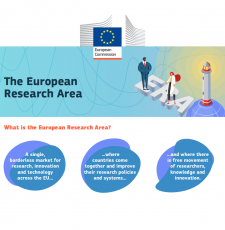
How can you make sure your open science policies and strategies take account of local needs, and at the same time, accommodate broader regional priorities? There is no one answer, says Iryna Kuchma, EIFL Open Access Programme Manager.
How to design open science policies that address local needs, and are at the same time aligned with regional - for example, African or European - priorities? I face this question every time I get involved in new open science policy development initiatives. And usually there is more than one answer, depending on the policy context.
What to include and how to future-proof your open science policy
Is there room for all the latest open science developments in a national policy document? How can we draft national open science policies that anticipate and are broad enough to accommodate future developments in open science?
We’ve had extensive conversations about this in the OpenAIRE Policy Task Force when we were revising European model open science policies for Research Funding and Research Performing organizations. Below are the most important elements from the model policies -
Open access to publications - repository deposits, immediate open access under a CC-BY licence, alignment with the cOAlition S Right Retention strategy and Horizon Europe requirements, and linking to research assessment and evaluation:
- Require researchers to deposit in a repository a machine-readable electronic copy of the full-text (published article or final peer-reviewed manuscript) before or at the time of publication.
- Retain ownership of copyright, and licence to publishers only those rights necessary for publication. Authors (or their organizations) must ensure open access to the Author Accepted Manuscripts or the Version of Record of research articles at the time of publication. All research articles must be made available under a Creative Commons Attribution CC BY licence or equivalent or, by exception, a Creative Commons Attribution, NoDerivatives CC BY-ND licence, or equivalent. For monographs, deposit remains mandatory, but access could be closed.
- For purposes of individual or institutional evaluation of research output, full texts of publications must be deposited in the repository.
Open access to research data - repository deposits, ‘as open as possible, as closed as necessary’, FAIR principles, Data Management Plans (DMPs):
- Require researchers to deposit in a suitable repository the data needed to validate the results presented in scientific publications. Data should be provided with persistent identifiers and, where possible, should be linked with publications.
- Require that data and services are handled according to open and FAIR principles (FAIR - Findable, Accessible, Interoperable and Reusable).
- Follow the principle ‘as open as possible, as closed as necessary’. If data cannot be open due to legal, privacy or other concerns (for example sensitive data or personal data) this should be clearly explained in the DMP.
- Require researchers to submit a DMP to the appropriate service for every research activity they are involved in.
- Require researchers to define usage rights through the assignment of appropriate licenses – CC BY or CC0 (or equivalent) licence.
- Require that data are stored for a certain period.
- The minimum archive duration for research data is 10 years, unless data needs to be deleted or destroyed for legal or ethical reasons.
Open science and citizen science -
- Actively encourage and track the uptake of open science practices (beyond open access to publications and data) such as involvement in citizen science projects, open peer review, the use and creation of open educational resources, etc.
- Support citizen science projects and where possible connect students’ curricula and degrees to citizen science projects as a means to rethink the knowledge production and circulation models inside and outside the university; include students in the design phase of such projects as an active learning approach and an in person experience; invest in in-house training to raise awareness and build capacity for students’ participation in projects for society; reward students’ performance as participants of citizen science projects with awards and extra academic excellence points.
Infrastructure: quality and interoperability -
- Ensure that a repository meets trusted quality standards (OpenAIRE compatible follows FAIR principles, has a transparent repository policy, etc.).
- Ensure that a repository is registered in international repository registries and is interoperable.
Research assessment and evaluation -
- Develop in cooperation with funding agencies and research performing organizations a framework for research assessment and evaluation that incentivizes research quality and open science behaviors and practices. Such systems should take into consideration disciplinary differences and their impact on researchers at different career stages.
- Set up reward mechanisms for researchers using open science practices (e.g. sharing provisional results through open platforms, using open software and other tools, participation in open collaborative projects (citizen science), sharing data, etc.); adopt open science metrics and ‘responsible metrics’, along with ways of rewarding the full diversity of outputs and of recording the broader social impact of research (‘next generation metrics’).
Skills, training and support -
- The library in cooperation with institutional departments or any other appropriate body (such as legal services, research support staff, research data management (RDM) experts) commits to developing training courses to facilitate the adoption of open science and equip researchers, librarians and other support staff with the necessary skills and expertise. Such training courses should include skills necessary for open access publishing, FAIR and open data and data management, research integrity, reproducibility and open science. Standardised and accredited skills for open science should be provided for researchers and required at all career levels, including among research students and supervisors. Training should be tailored to different disciplines and delivered to researchers at all career stages and should be embedded into curricula.
Need more European inspirations? Check out ‘National Open Science Cloud initiatives models’ from NI4OS project that examines existing open science policies and models in Europe, describes the elements an Open Science Cloud model should include, and proposes workflows for setting up National Open Science Cloud Initiatives.
What’s practical in the national context?
How could the elements and principles listed above be implemented in specific national or institutional policies? Let’s look at Latvia and Ukraine, both EIFL partner countries, where national open science policy making processes are currently underway.
The proposed Latvian Open Science Strategy has three pillars: open access; FAIR data, and citizen science. The proposed strategy includes requirements and incentives for open science practices, e-infrastructure and tools, skills, and open science monitoring as underlying principles.
For open access, all state-funded research publications must be open access without an embargo period.
For FAIR data, a national data repository, DataverseLV, is being set up. A national data stewards programme will be rolled out as the main instrument for building RDM skills and encouraging the use of e-infrastructures and tools, developing general and discipline-specific skills and practices, joint coordination and training. There is the first data steward vacancy at Riga Stradiņš University and about 30 more data stewards at postdoc salary are planned. Competence centres, data stewards and academic libraries will be building researchers’ open science skills.
Societal involvement is important in all stages of the research process with emphasis on co-creation and benefits to society and science. For citizen science, the proposed strategy incorporates ‘The Ten Principles of Citizen Science’ from the European Citizen Science Association. And there is support from the Ministry via the Research Latvia platform and research data infrastructures.
Open science will be integrated in research evaluation and there will be a National Open Science Coordinator. And research institutions will be encouraged to develop their open science strategies.
More information in this presentation by Aleksandrs Martiņš Blūms, RIS3 Expert, Ministry of Education and Science of the Republic of Latvia.
Ukraine’s proposed open science strategy prioritizes, in this order, awareness raising, competence and skills building, e-infrastructure development, open science policies, radical changes in research assessment and evaluation, open access to publications, open and FAIR data, DMPs and data stewards, reproducible science and open peer review. In Ukraine, there is greater emphasis on awareness raising and building researchers’ skills than in Latvia. Reproducible science and open peer review also play an important role in Ukraine’s open science policy discussions.
National open science roadmaps in Africa
The UNESCO Open Science Partnership offers a strategic opportunity to advance open science in Africa by putting this on the agenda of national governments. EIFL is one of several partners in the LIBSENSE initiative which is working with African countries to develop national Open Science Roadmaps. Among the countries developing roadmaps are six EIFL partner countries - Côte d’Ivoire, Ethiopia, Ghana, Lesotho, Tanzania and Uganda.
You can watch Dr Cécile Coulibaly and David Bukenya, our country coordinators in Côte d’Ivoire and Uganda respectively, presenting their national open science policy development plans at the WACREN 2021 conference recording (Dr Coulibaly 1:05-1:15 in French; Bukenya 1:28 - 1:35 in English). Open science awareness raising, policy development and capacity building are common elements of the Côte d’Ivoire and Ugandan roadmaps. There is also a strong focus on broad stakeholder engagement, setting up open science infrastructure, encouraging open science practices, and in Uganda, developing online open science courses and creating practice hubs in universities.
How do we align local and global priorities?
How do we align local and global priorities? As I’ve said, there is no one answer, because every national context is different. But there are useful regional and local models to draw on and experiences to learn from. Decide what matters to you: try to move away from competition and towards collaboration, build trust and enable open, reproducible and transparent science.
And what’s your recipe?
SHARE / PRINT








